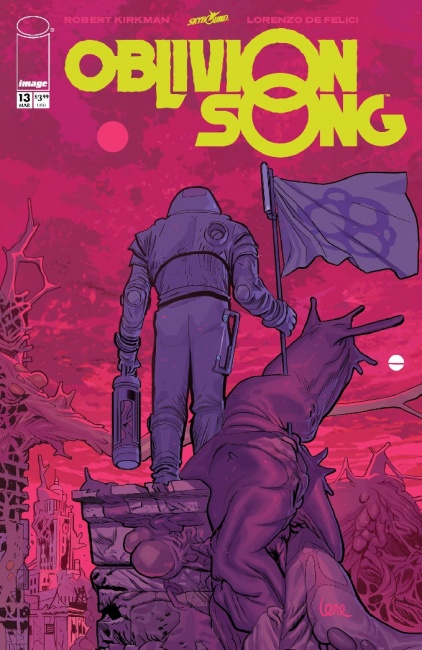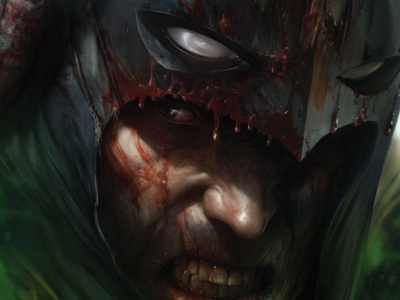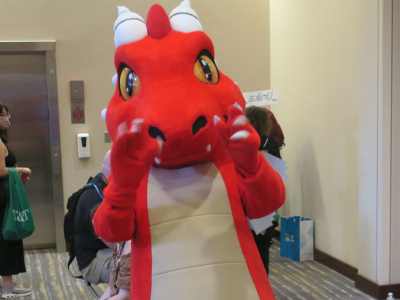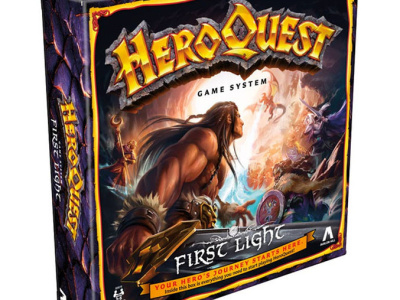We caught up to The Walking Dead writer and creator Robert Kirkman last week in the run-up to the launch of the second arc of Oblivion Song, his latest comic series. In Part 1 of this two-part interview, we heard his thoughts on the state of the comics market, on continuing series vs. miniseries, and on the creation of and early response to Oblivion Song. In Part 2, we talked about the impact of first issues on the market, about Oblivion Song’s new arc, about the Invincible movie and TV series, and about Skybound’s game business.
ICv2: You're an Image Comics partner and one of the bestselling writers in both the comics and book channels. What are your views on the current state of the business?
Robert Kirkman: I don't ever want to be adding to the chorus of doom and gloom. I think that the comic book industry has suffered from this overall air of, "Oh, things aren't going well. Everything's going to the toilet. What are we doing?" That seems to be something where there's think pieces on all the news sites, creators get together and bitch about things. That's all fun and everything, but overall, I take a pretty positive view of things. I think that there are still opportunities and there's obviously bright spots where sales spike up, and you see people doing something right, and getting rewarded for it. I like that, because I think it would be hard to deny that we're not currently in a down period.
I'm certainly seeing that our numbers internally are in just a slight slump. I think that maybe that's a market correction of the boom in creator-owned comics that we experienced five or six years ago.
Things will level out, and then things will come back. It's all cyclical. We're definitely in a down cycle right now, which is unfortunate, but I think we'll come out of it just fine.
That's basically the question we ask when we’re talking about the overall market: do you think this is a cyclical change or a secular one? It sounds like you're in the first camp.
Yeah, it's something that has happened many, many times before. Also, I could sit back and say (this might be a little controversial, you're recording this, aren't you) I feel like a lot of the complaints come from people not recognizing their age, and not recognizing the fact that over time, we're going to lose touch with what it is that is at the core of this industry.
I've been doing this for almost 20 years now. I don't know, I feel like I'm getting up there. It's very easy for me to go, "There are less books being published now that are exciting me, and therefore that is a problem." You have to recognize that as we get to this advanced age, that the industry is not necessarily going to be catering to my tastes, and that is absolutely fine, and the way things should be. So when you hear the complaints, sometimes it's like, "That's just old man‑ism. That guy needs to calm down." If there's less comics for them, then that's good, because there's fewer of him. I try to be mindful of that as much as I can.
Let's talk about Oblivion Song. We took a look at the numbers, and it looks like that's your second‑best selling title of the books you're working on now (see "Top 500 Comics – December 2018"), behind only The Walking Dead. Why do you think it's getting the response it is?
Like with everything that I do, I try to come up with something that's somewhat unique. I try to look for things that aren't really being serviced in the industry. There are a wealth of science fiction books out there, but [this is] something that has a very visceral monster element to it, and has heightened action, but also has really quiet character moments. I think Oblivion Song, more than anything else that I do, actually does provide an audience with the things that Walking Dead provides without copying it (to a certain extent), because Walking Dead does have cool action moments and big spectacles, but it has a lot of quieter moments (some would say too many).
I don't often do things that appeal to the Walking Dead audience. I'm always trying to do things that are different. With Outcast, I try to make things as slow‑burning as possible, and really get into the character development. That doesn't necessarily appeal to everybody that is into The Walking Dead, and likes watching people shoot zombies. With Die! Die! Die! I’m trying to do something that is a really edgy, weird, espionage story. That ended up being very niche. I think Oblivion Song just plays to the strengths of what I do well in The Walking Dead.
What was the process of building the world? When does the artist come in? What are your respective roles in building the world?
The overall skeleton of things is something I come up when I'm coming up with what my next project is going to be, or crafting the overall structure of the story. I always try to bring in an artist, a co‑creator, a partner, as early as possible.
Especially with something like Oblivion Song where everything is so visual, it's almost hard for me to continue writing the story before I know how the world is going to look. That dictates how the world is going to work; story comes out of that.
In the case of Lorenzo De Felici, he was very hands‑on from the get‑go, where I would just go, "I don't know, it's a different dimension that has different vegetation. I'm thinking they might be mold or fungus‑based, just as a visual reference."
He hit the ground running with, "Here's how the animals work. Here's how their structures and body types are, and here's how the different animals relate to each other, so that they look like they're from the same world."
He really rolled the sleeves up, really came up with all of the visual elements, and fleshed out that world to a point where I could just sit back and say, "OK, I'll throw these creatures in here. Oh, it looks like these creatures do this kind of thing." And it's great, because once he did that initial work, I knew exactly how much I could lean on him. It got to a point where I would say, "OK, we need a little creature that does this for this scene." I would just write that into the script, knowing without too much lead time, he could handle that, and work something into the story that would fill the need of what I need in that scene. He's been essential.
In terms of a given story, what do you give him? Do you give him a full script, plot, page breakdowns?
I write in full script. On the surface, my scripts can be somewhat restrictive, just because the way I write, I picture the page; I'm basically describing the page as I view it in my head. I'll go as far as to say, "There's a wide panel here. There's three small panels below it. There's a wide panel at the bottom."
A lot of that is only there because I know how much dialogue I'm putting in a panel, and that's going to dictate the panel size. I know I'm writing the action in a way that sometimes, you'll need a bigger panel to service the action, sometimes, you'll need a smaller panel. I always make it clear with the artist. That's just so when I'm writing, I can picture the page, and I know that I'm not putting too much information in a panel, or not too much information on a page.
That layout is really just for me. Once the script is turned in, I have some artists that change the layouts completely. I have other artists that follow it somewhat. Some artists say that it helps. Some artists are like, "Yeah, I just completely ignore that, and do my own thing." And that's always fun. I feel like if I wasn't on top of what structurally fits on a page, I'd be going crazy, and writing scenes that wouldn't really work. It's important to me to go that extra mile, and throw that structure in.
Then as you're building out a world, do you ever think about how the world you're creating will adapt into other media, or is it strictly a comic book?
I have to make it strictly a comic. It would be very easy for me, because I am well‑versed in how productions go at this point, to go, "Oh, well, I'll make this monster smaller, so it can be a guy in a suit, instead of a CG thing."
Or, "Let's change the world this way, so that it'll work better on a set." There's different things that I could do to make a production easier, but that would be limiting to the comic space. The beauty of doing a comic is that you don't have those limitations.
I'm always very mindful of anytime anything like that creeps into my head of, "It would be better if you did this." I end up pushing myself in the opposite direction because I want to stay, quote, true to the streets, unquote, if that makes any sense.
I don't want to feel like I’m a Hollywood sellout by structuring my comics for other mediums. That's why later on in Walking Dead, you get things like pet tigers. That was because I was like, "Oh, it'd be cool if this guy had a weird pet."
Then I'd be like, "Well, I don't know. That's not going to really adapt well in the show." Then I'd be like, "Don't be a sellout, Kirkman. Give them a tiger." You could even argue that I would have thought a tiger was too outlandish if the show didn't exist, but because I didn't want to feel like I was editing things for the show, I went that extra mile, and crossed that line, and actually put a tiger into the story. It might actually make things even crazier, because I try to do that.
I could have smaller monsters in Oblivion Song, if I wasn't worried about the idea of trying to cater things for another medium. That's when I end up with giant, four‑story monsters, and all kinds of insanity that would possibly only ever work to its fullest in comic book form.
You're starting a new arc, which we want to ask about, but before that, we want to ask about how you handle new arcs. Unlike a lot of publishers and creators, you start a comic series, and just keep going. You don't do miniseries. When a new arc starts, it's just a new number in the series. Can you talk a little bit about why you do it that way?
I feel like that's the preferred method of comics. A lot of things I do just based on myself as a fan. That's what I would want. I don't want to have to track, "Oh, well, this number one came after this other number one." Then, "Oh, but that other number one came in between those two number ones." You break the system of following a series, or even collecting, because collecting is an aspect of our business that I don't think is bad. We are writing stories and crafting narratives that you want people to enjoy, but comic books have that added bonus of also being a collectible.
You want to have somebody that goes, "Oh, I got issue 36. I got issue 89. I got this whole run. This is totally something that I love having." I'm into that myself, as a comic book collector. I don't want to have those starts and stops in a series.
While I recognize that some publishers think that you get a little bit of extra juice every time you start something over with a new number one, I think if you actually look at the data, it more often than not provides a jumping‑off point.
You can watch attrition really kick in as you keep re-starting those books. Unless it's a massively different and popular creative team that's taking over with the new number one, it's something that I'm very much against.
I think that you want to make following the series as simple as possible. I very strongly believe that the reason the Walking Dead television show has led to a huge spike in comic book sales is because anyone can go into a bookstore and comic book shop and say, "I want to read Walking Dead. What do I do?"
They go, "The book with the number one on it. Find the book with the number one on it, whether that's the hardcover, the compendium, or the trade, and try that. If you like that, come back and get the one that matches it with the number two on it."
It's that simple. If you look at any of the DC shows, Marvel movies, Marvel shows, or a lot of the other stuff coming out… Somebody loves Spider‑Man: Into the Spider‑Verse. They walk into a bookstore, and they're like, "Hey, I want to buy a Spider‑Man book. Where do I start?"
They're like, "Well, I like the Dan Slott run. Buy his number one," or, "Well, you really want to get this Visionaries book with Michelinie and McFarlane. That's got a number one." There's 45 different number ones. It's very unclear where a novice fan would actually begin their journey into comics, which I think is a really bad thing. It's a disservice we've done to comics as a whole.
Keep things simple. Volume one, volume two, volume three. Stick with it. That's the way I prefer to do things.
Click here for Part 2.
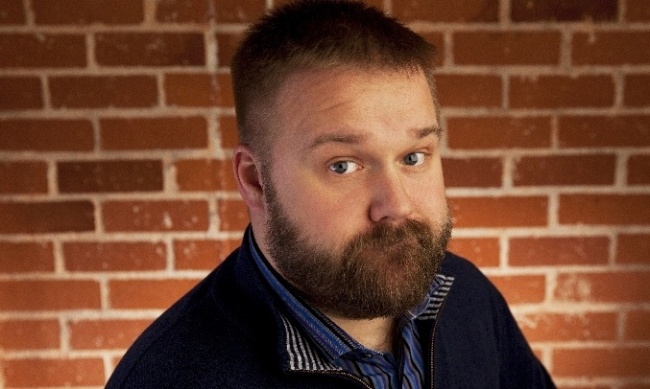
Thoughts on the State of the Market, Continuing Series or Miniseries, the Creation of and Early Response to 'Oblivion Song'
Posted by Milton Griepp on January 29, 2019 @ 4:23 am CT
MORE COMICS
From Dynamite Entertainment
August 8, 2025
Here's a preview of Space Ghost #1, published by Dynamite Entertainment.
Dark, Erotic Manga Based on Short Story by Edogawa Rampo
August 8, 2025
Maruo brings his signature “erotic grotesque” style to a dark tale by writer Edogawa Rampo.
MORE NEWS
Thursday July 31, 2025; 'D&D,' 'Riftbound,' and More!
August 8, 2025
The story of Gen Con 2024, as told through ICv2's staff photos, began on the morning of Thursday July 31, 2025 on the convention hall floor.
New Expansion Set for the Classic Fantasy Board Game
August 8, 2025
Hasbro will release HeroQuest: First Light, a new expansion for the classic fantasy board game, into retail.




